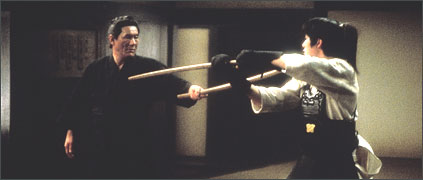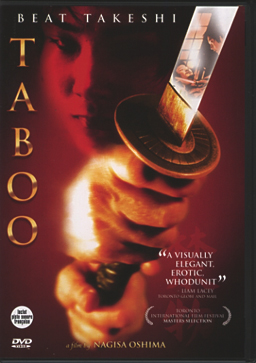| Release List | Reviews | Price Search | Shop | Newsletter | Forum | DVD Giveaways | Blu-Ray/ HD DVD | Advertise |
| Reviews & Columns |
|
Reviews DVD TV on DVD Blu-ray International DVDs Theatrical Reviews by Studio Video Games Features Collector Series DVDs Easter Egg Database Interviews DVD Talk TV DVD Talk Radio Feature Articles Columns Anime Talk DVD Savant HD Talk Horror DVDs Silent DVD
|
DVD Talk Forum |
|
|
| Resources |
|
DVD Price Search Customer Service #'s RCE Info Links |
|
Columns
|
 |
Savant Short Review:Taboo
|
||||
New period samurai films are becoming a rarity, but 1999's Gohatto (Literally, 'against the rules') is from the important Japanese director Nagisa Oshima, who made shocking social comment pictures in the '60s like Death by Hanging, and gained international notoriety for his erotic 1976 film, In the Realm of the Senses. After a long stint in television, Oshima returned to the big screen with this beautifully realized film, which was anticipated as another daring taboo-breaker. Instead, it's a sober and somewhat frustrating look at sex in the military that refuses to be emotional or to draw conclusions about its own subject matter. It has some themes in common with Oshima's earlier Merry Christmas, Mr. Lawrence. It ought to be required viewing at West Point, because its political-social observations about suppressed gay activity in the ranks must be a universal military issue.
Using spare intertitles and scenes of unusual beauty, Oshima tells the story of a garrison of samurai militia during the decline of the shogunate power, when recruits were hard to come by. Even some of the officers aren't skilled swordsmen, and to hold things together Hijikata must command his troops with a combination of discipline and sympathetic concern for their problems. In a very un-sensational manner, Taboo shows how semi-covert homosexual activity in an all-male society takes on a destructive bent. Even before the murders occur (one of the soldiers is a psycho killer), the incompatibility of 'love' and military life is made all-too evident. The leaders accept the existence of soldiers with 'leanings', but the clandestine nature of their activities creates another, unacknowledged hierarchy of loyalties and jealousy within the military structure. In other words, 'don't ask don't tell', doesn't work because the emotions involved bring all the hidden sex to the surface anyway. With many men rumored to be lovers of the 'beautiful' new recruit, the motives of the officers who favor Kano are in question, especially when Kano is given preferential treatment. When emotions run too high, a petty distraction (the straight officers joke about it) can become something dangerous. 
Kano has a feminine face and lips that Clara Bow would envy; perfectly combed locks of hair jut across his cheeks, and he walks in a just-so way, not exactly effeminate, but definitely not masculine either. He's a perfect provocation for closeted gays because he keeps silent about himself and prefers to watch the effects of his attraction on others. He's so aloof, his lovers always assume someone else is his first choice, creating a situation that's disruptive to morale. Kano assumes that any soldier who approaches him can only be doing so for one reason, which also generates tension. When asked, he says he joined the militia to be able to kill legally, which seems to be his only real passion. Top-billed Beat Takeshi is a Japanese television personality and director. His Hijikata is a thoughtful blend of disciplinarian and thinker, and we see him ponder the problem of what to do about the trouple in his corps. Because all the action and emotions remain rather remote and subdued, viewers who aren't reading between the lines may see the film as a samurai story where little happens and nothing is explained. Visually, the film is a treat. The settings are interesting and the camera is not used so formally as to become static. One entrance by a fully-adorned geisha is a beautiful showstopper. Most of the fights happen at night and are not choreographed as action pieces, but the final confrontation takes place in a spooky stylized set similar to those in Kwaidan. Taboo is still more of a samurai murder mystery than a story about gays per se. The politics of the militia are fascinating, and there is the obiligatory beheading scene and some swordfighting skirmishes. The packaging misleadingly implies that this is a standard martial-arts samurai film, which it is not. Although the 'gay activity' onscreen is minimized, it will probably come as a very unwelcome surprise to viewers not expecting it. The film is not rated, indicating it did not get a standard American theatrical run, but the Canadian rating is 14A, which tells you that there's no nudity or graphic content. This may be a Canada-only DVD release ... DVD Talk's Geoffrey Kleinman found it only at VideoFlicks. Columbia TriStar's DVD of Taboo is a flawless transfer of a beautifully-photographed set of images. The only extra are some text biographies of the cast, director and composer Riyuchi Sakamoto; to figure out what I was looking at I had to refer to the web and other reviews. Several of these reviews noted that the popularity of Crouching Tiger, Hidden Dragon was attracting interest in Taboo; undoubtedly it surprised many who expected the usual martial arts spectacle.
On a scale of Excellent, Good, Fair, and Poor,
|
| Coming Soon |
|
|
| Special Offers |
|
|
| Columns |
| Home | Release List | Coupons | Shop | Reviews | Forum | Video Games | Price Search | Advertise |









